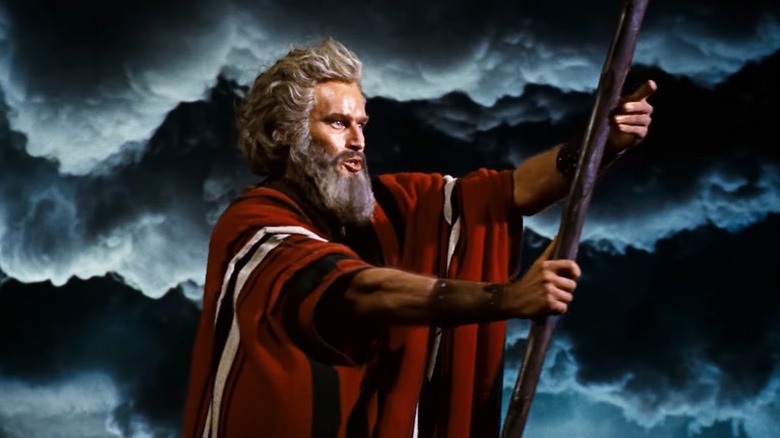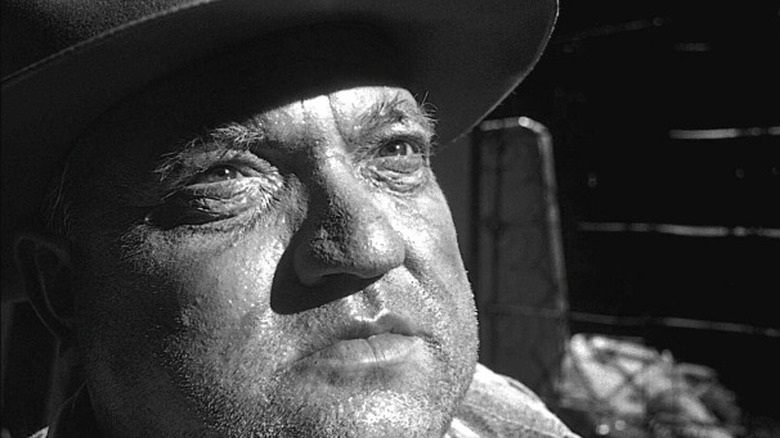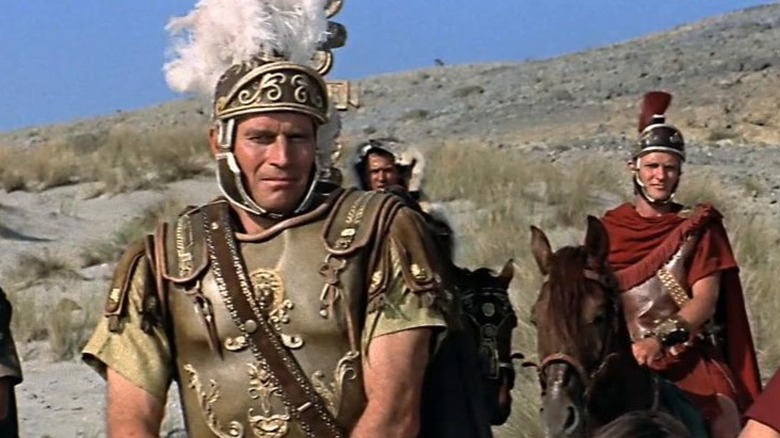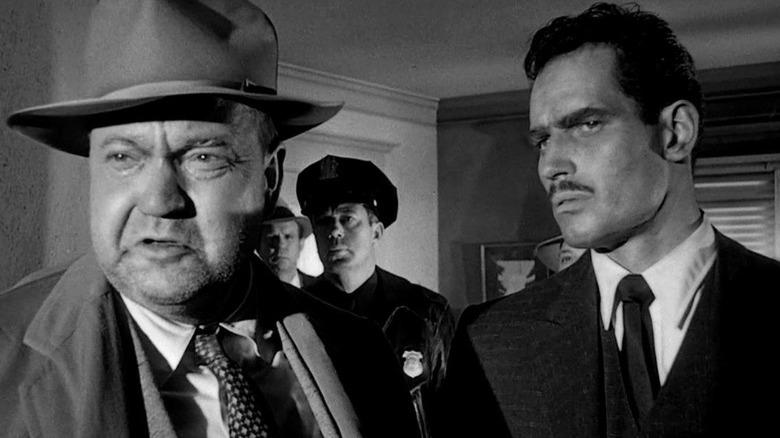Why Charlton Heston Had 'No Desire' To Get Into The Director's Chair
Charlton Heston, the legendary star of "Ben-Hur" and "The Ten Commandments," initially had no interest in directing films. As unusual as that was for an actor of his stature, it may be one reason why the few movies he actually did end up directing are so unmemorable.
The list of movies bearing his name as director is fairly sparse: there's a made-for-TV spy flick, a 1972 adaptation of Shakespeare's "Antony and Cleopatra," and the "Treasure of the Sierra Madre"-esque adventure movie "Mother Lode." There's a reason Heston is best known for the movies in which he starred. He had charisma and talent to spare on screen, but it didn't necessarily translate behind the camera.
"Shakespeare on Screen" writer Daniel Rosenthal referred to Heston's "Antony and Cleopatra" as "laughable" and "overlong." Nearly a decade later, "Mother Lode," from a screenplay by Heston's son, fared a little better with a positive review in Variety, but little cultural impact.
Still, the actor was initially adamant that he was not interested in that aspect of filmmaking. In 1970, two years prior to the release of "Antony and Cleopatra," Heston had appeared on "The Dick Cavett Show," where he explained his disinterest in directing. "People automatically imagine that actors want to direct," he told Cavett, who was well-aware of how often actors chose to enter the director's chair. "I don't think so."
Actors who direct
It may seem odd that Charlton Heston vocally rejected the shift from acting to directing.
Other stars of his stature had taken that career shift, even if they only got one film under their name. John Wayne directed war epics like "The Alamo" and "The Green Berets." Ida Lupino, working in the hardboiled world of social issues drama, directed taut, tough movies like "Outrage" and "The Hitch-Hiker." And Orson Welles, who worked with and heavily inspired Heston on the set of 1958's "Touch of Evil," was one of the greatest actor-directors ever.
Many classic Hollywood actors had a natural inclination towards filmmaking, as if the years they spent on set had lit a fire for them. There's a reason for the classic line, "But what I really want to do is direct."
Heston didn't have that desire, though — at least, not at first. If that lack of ambition was unusual for an actor with his talent, it might make more sense given his fairly no-nonsense perspective on the nature of motion picture artistry. He was extremely against actors performing their own stunts and totally unwilling to entertain any notion of queer subtext in his greatest film, "Ben-Hur." As he expressed in that Dick Cavett interview, Heston was capable of recognizing that the skillset necessary for directing was a bit beyond him. What he could bring to the movies in which he starred, beyond his own potent screen presence, existed totally outside of direction.
The captain
"I have a loud voice and I argue a lot," Charlton Heston said during his Cavett talk show appearance. But if the director, whom he thought of as the "captain" on the set of a movie, wanted him to do a scene a certain way, he would do it. As far as he was concerned, the director was the be-all, end-all authority behind the movie's design. "Film is the director's medium," he said. Heston's previous experience with directing had been solely "on the stage," and it hadn't been for him at all.
Still, that didn't mean that he had no authority when it came to the making of a movie. Later in the interview, he discussed how for many of the movies in which he starred, he would be there from the earliest days of the script. He would see the project develop, see the script change, and the art designers get to work, but he would also witness the director be the ultimate artist shaping the movie.
As a big name actor with some control over a movie's production, Heston could give his directors the raw material with which they could sculpt a good movie. That degree of influence, somewhat unique among actors, meant that Heston didn't really need to direct to be able to exercise his sense of taste.
He may have learned this in the wake of the making of 1958's "Touch of Evil," where his vouching for co-star Orson Welles led to Welles' directing the film.
Orson Welles, editors, and Heston's failure
Heston had a great deal of respect for Orson Welles, claiming in the Cavett interview that he was "probably the single most talented guy I've ever worked for." Welles, whose reputation will probably be up for debate to the end of time, represented not just a maverick filmmaker who played by his own rules, but, for Heston, a true artist with the precision of a watchmaker. Heston would watch Welles and his "Touch of Evil" editors Aaron Stell and Virgil Vogel make "more of a contribution" than the actors by changing the tone of a scene by simply shifting a few frames around.
If the timing had lined up, Heston would have hired Welles to direct his adaptation of "Antony and Cleopatra," according to the Chicago Tribune. With Welles unable, Heston did it himself. "100 Shakespeare Films" writer Daniel Rosenthal quotes Heston's autobiography, which features the actor acknowledging "Antony and Cleopatra" did not reach the heights he hoped: "The film I cared more about than any I've ever made was a failure." Turns out he had been correct about his abilities during his "Dick Cavett" appearance.
The movie was indeed a failure. Where Heston's one-time director Orson Welles had crafted some of the greatest Shakespeare films of all time, such as the Falstaff movie "Chimes at Midnight," Heston's vision felt inadequate. Nevertheless, Heston's shrewd evaluations of the sometimes-conflicting roles of actors and directors (and editors) reveals that at the very least, he understood the alchemy a movie needed to succeed. That alchemy just never found the right potency when he was in the director's chair.



